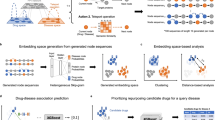Abstract
Cancer literature contains a rich body of implicit knowledge which can play an important role in drug repurposing. However, classical knowledge retrieval techniques used in Literature Based Discovery (LBD) suffer from the problem of incomplete knowledge extraction resulting in a large number of knowledge entities being missed. Recently, knowledge graphs (KGs) have been used to represent literature-derived knowledge and support knowledge discovery by representing relations between concepts. Knowledge Graph Completion (KGC) has been proposed as a method to augment knowledge represented as a KG by predicting potential missing relations between concepts in a KG. We posit that KGC methods can be applied to LBD with the goal of augmenting KGs and finding implicit knowledge by reasoning over the KG. In this paper, we present KGC methods (such as FocusE-TransE) to predict missing relations between head and tail entities, rather than the standard head or tail prediction task. Our focus is the generation of a cancer-focused drug repurposing KG, via LBD, replicating recent cancer drug repurposing discoveries. We utilized a time-slicing approach to construct incomplete KGs using semantic triples extracted from cancer literature. Next we apply our KGC methods to augment the base KG, and apply discovery patterns on the augmented KG to generate drug-gene-disease semantic paths that replicate recent cancer drug repurposing discoveries. Further, we assessed the LBD output by comparing drug-disease associations reported in the literature. Our work presents a scalable knowledge discovery framework combining KGC, LBD, and associations measures to discover meaningful implicit knowledge from the literature.
Access this chapter
Tax calculation will be finalised at checkout
Purchases are for personal use only
Similar content being viewed by others
References
Pushpakom, S., et al.: Drug repurposing: progress, challenges and recommendations. Nat. Rev. Drug Disc. 18, 41–58 (2019)
Zhang, R., Hristovski, D., Schutte, D., Kastrin, A., Fiszman, M., Kilicoglu, H.: Drug repurposing for COVID-19 via knowledge graph completion. J. Biomed. Inform. 115, 103696 (2021)
Zhang, X., Che, C.: Drug repurposing for Parkinson’s disease by integrating knowledge graph completion model and knowledge fusion of medical literature. Future Internet 13, 14 (2021)
Kilicoglu, H., Rosemblat, G., Fiszman, M., Shin, D.: Broad-coverage biomedical relation extraction with SemRep. BMC Bioinform. 21, 1–28 (2020). https://doi.org/10.1186/s12859-020-3517-7
Chen, Z., Wang, Y., Zhao, B., Cheng, J., Zhao, X., Duan, Z.: Knowledge graph completion: a review. IEEE Access 8, 192435–192456 (2020)
Rossi, A., Barbosa, D., Firmani, D., Matinata, A., Merialdo, P.: Knowledge graph embedding for link prediction: a comparative analysis. ACM Trans. Knowl. Disc. Data (TKDD) 15, 1–49 (2021)
Pai, S., Costabello, L.: Learning embeddings from knowledge graphs with numeric edge attributes. arXiv preprint https://arxiv.org/abs/2105.08683 (2021)
Choi, W., Lee, H.: Identifying disease-gene associations using a convolutional neural network-based model by embedding a biological knowledge graph with entity descriptions. PLoS ONE 16, e0258626 (2021)
Bougiatiotis, K., Aisopos, F., Nentidis, A., Krithara, A., Paliouras, G.: Drug-drug interaction prediction on a biomedical literature knowledge graph. In: Michalowski, M., Moskovitch, R. (eds.) Artificial Intelligence in Medicine, vol. 12299, pp. 122–132. Springer, Cham (2020). https://doi.org/10.1007/978-3-030-59137-3_12
Nováček, V., Mohamed, S.K.: Predicting polypharmacy side-effects using knowledge graph embeddings. AMIA Summits Transl. Sci. Proc. 2020, 449 (2020)
Chang, D., Balažević, I., Allen, C., Chawla, D., Brandt, C., Taylor, R.A.: Benchmark and best practices for biomedical knowledge graph embeddings. In: Proceedings of the Conference. Association for Computational Linguistics. Meeting, vol. 2020, p. 167 (2020)
Henry, S., McInnes, B.T.: Literature based discovery: models, methods, and trends. J. Biomed. Inform. 74, 20–32 (2017)
Capper, C.P., Larios, J.M., Sikora, M.J., Johnson, M.D., Rae, J.M.: The CYP17A1 inhibitor abiraterone exhibits estrogen receptor agonist activity in breast cancer. Breast Cancer Res. Treat. 157(1), 23–30 (2016). https://doi.org/10.1007/s10549-016-3774-3
Kühnle, M., et al.: Potent and selective inhibitors of breast cancer resistance protein (ABCG2) derived from the p-glycoprotein (ABCB1) modulator tariquidar. J. Med. Chem. 52, 1190–1197 (2009)
Schmidt, K., et al.: Targeting fibroblast growth factor receptor (FGFR) with BGJ398 in a gastric cancer model. Anticancer Res. 35, 6655–6665 (2015)
Bar-Zeev, M., Kelmansky, D., Assaraf, Y.G., Livney, Y.D.: Β-Casein micelles for oral delivery of SN-38 and elacridar to overcome BCRP-mediated multidrug resistance in gastric cancer. Eur. J. Pharm. Biopharm. 133, 240–249 (2018)
Costabello, L., Pai, S., Van, C.L., McGrath, R., McCarthy, N., Tabacof, P.: AmpliGraph: a library for representation learning on knowledge graphs (2019)
Daowd, A., Barrett, M., Abidi, S., Abidi, S.S.R.: A framework to build a causal knowledge graph for chronic diseases and cancers by discovering semantic associations from biomedical literature. In: 2021 IEEE 9th International Conference on Healthcare Informatics (ICHI), pp. 13–22. IEEE (2021)
Author information
Authors and Affiliations
Corresponding author
Editor information
Editors and Affiliations
Rights and permissions
Copyright information
© 2022 The Author(s), under exclusive license to Springer Nature Switzerland AG
About this paper
Cite this paper
Daowd, A., Abidi, S., Abidi, S.S.R. (2022). A Knowledge Graph Completion Method Applied to Literature-Based Discovery for Predicting Missing Links Targeting Cancer Drug Repurposing. In: Michalowski, M., Abidi, S.S.R., Abidi, S. (eds) Artificial Intelligence in Medicine. AIME 2022. Lecture Notes in Computer Science(), vol 13263. Springer, Cham. https://doi.org/10.1007/978-3-031-09342-5_3
Download citation
DOI: https://doi.org/10.1007/978-3-031-09342-5_3
Published:
Publisher Name: Springer, Cham
Print ISBN: 978-3-031-09341-8
Online ISBN: 978-3-031-09342-5
eBook Packages: Computer ScienceComputer Science (R0)




